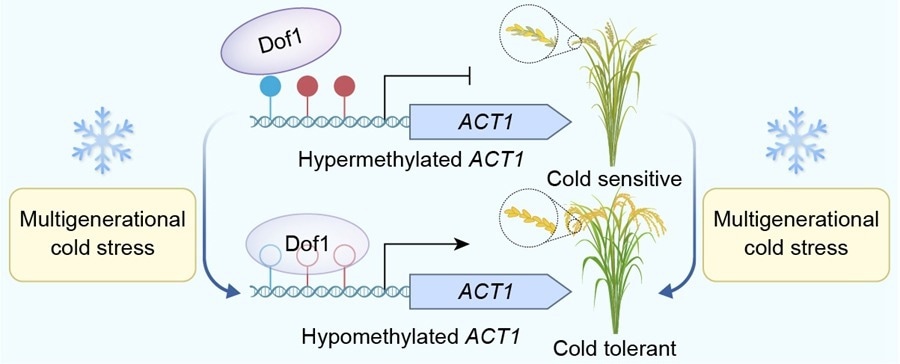Reviewed by Lauren HardakerMay 27 2025
Chinese researchers recently discovered molecular evidence supporting Lamarckism, a long-debated theory from the early 19th century that suggests acquired traits can be inherited.
 Multigenerational cold stress induces heritable ACT1 promoter hypomethylation, enabling rice to acquire cold tolerance for high-latitude adaptation. Image Credit: IGDB
Multigenerational cold stress induces heritable ACT1 promoter hypomethylation, enabling rice to acquire cold tolerance for high-latitude adaptation. Image Credit: IGDB
The evidence was discovered in a new study by researchers from the Chinese Academy of Sciences’ Institute of Genetics and Developmental Biology, who analyzed the evolutionary patterns of cold adaptation throughout rice’s northward expansion. The findings were published on May 22nd, 2025, in Cell.
Prof. Xiaofeng Cao led the study, which found that DNA methylation, a type of epigenetic variation or change in gene expression, controls the transgenerational inheritance of acquired cold tolerance in rice, corroborating Lamarck’s theory.
In this study, the researchers followed rice’s evolutionary history as it spread northward into colder areas. They used a unique multigenerational cold-stress screening approach aimed at the cold-sensitive meiosis stage of rice development to apply directional selection over three generations, selecting and breeding rice plants that could withstand cold.
This technique resulted in stable rice lines with significantly higher cold tolerance, which were driven by characteristics with dominant inheritance patterns. This tolerance lasted at least five generations, even after the stress situation was eliminated.
The crucial epigenetic variation, revealed by multi-omics analysis, is hypomethylation at the arabinogalactan protein-coding gene (ACT1) promoter. The researchers employed a DNA methylation editing technique to accurately alter the methylation of the promoter of the arabinogalactan protein gene ACT1.
In doing so, they accomplished directional modulation of cold tolerance and verified that cold-induced hypomethylation in the promoter lifts inhibition of ACT1 production, demonstrating the causative involvement of epigenetic variation.
To determine the molecular basis of this epigenetic regulation, the researchers investigated the underlying process. They discovered that cold stress reduced the expression of DNA methyltransferase MET1b, affecting methylation maintenance at the ACT1 promoter and resulting in a hypomethylated epiallele.
Further research revealed that the methylation variation area of the ACT1 promoter contains a binding site for the transcription activator Dof1, whose occupancy is dependent on DNA methylation state.
Dof1 knockout lowered cold tolerance during booting, leading to a regulatory cascade of cold stress → MET1b downregulation → ACT1 promoter demethylation → increased Dof1 binding → ACT1 activation → improved cold tolerance.
Natural variation study revealed that, whereas ACT1 coding sequences were substantially conserved, their DNA methylation status contained polymorphisms that were strongly related to cold tolerance.
Among 131 landraces from three major rice-growing regions in China, over 88 % of types from the southern and central regions had hypermethylated ACT1, whereas those from the frigid northeastern region had significantly more hypomethylated ACT1.
This “south-high, north-low” methylation gradient indicated that ACT1 epigenetic variation was an important focus of selection during rice domestication and geographical expansion.
In addition to establishing a molecular mechanism for quick environmental adaptation, this study offers strong evidence in favor of non-Mendelian inheritance theories that have long been marginalized in evolutionary biology by methodically clarifying the role of cold-induced epigenetic variation in rice adaptation.
Peer reviewers praised the work, stating, “This possibility has implications for understanding adaptive processes and hints at mechanisms that are outside the traditional Darwinian paradigm.”
The research offers a practical framework for crop development in addition to its theoretical implications. To create stress-resilient crops, the researchers suggest a unique breeding technique called “stress domestication → epigenetic variant identification → precision editing”. This strategy presents a viable way to address the issues facing agriculture brought on by climate change.
Source:
Journal reference:
Song, X., et al. (2025) Inheritance of acquired adaptive cold tolerance in rice through DNA methylation. Cell. doi.org/10.1016/j.cell.2025.04.036